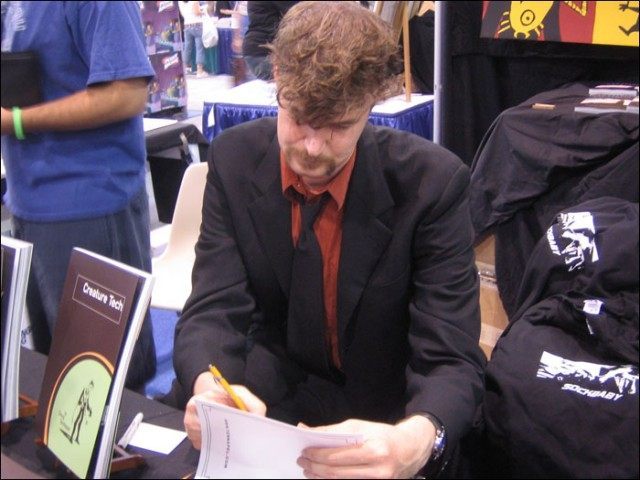For more than a decade, the comics, cartoons, animations, and video games of Doug TenNapel have been entertaining millions. Yet a single opinion that swam against the tide of progressive thought caused him to be subject to years of attacks from an all-too-familiar mob of online public shamers.
TenNapel has a long and accomplished career in entertainment. He’s the man behind Earthworm Jim, a 1990s smash-hit video game that spawned a cartoon series and a toy franchise. He has written an episode for the popular animated series’ Adventure Time and acted as a guest animator for Spongebob. His most recent creation is Armikrog, a point-and-click puzzle game created with stop-motion animation.
Despite his obvious talents, there’s a niggling aspect of TenNapel that continues to cause him problems: he’s a Christian Conservative. In addition to his other creations, he’s the series writer and executive producer for VeggieTales in the House, an animated series popular with Christian families. He has also designed the cover art for a number of Christian rock bands.
In the liberal, progressive world of arts and entertainment, it was only a matter of time before such an unfashionable background got him into trouble.
The inevitable happened in 2011, when TenNapel publicly disagreed with the rising tide of support for gay marriage. At the time, TenNapel maintained that what’s “appropriate for one sex isn’t automatically appropriate for another” and that allowing gay marriage would be the equivalent of “letting a man take a dump in the ladies’ room.” His comments were posted in a blog on the website GayGamer.net, the author of which suggested that whether readers would want to continue reading his webcomics after learning of his views was “up to them.”
An online witch-hunt quickly followed, of course, with some online commenters attacking TenNapel in terms the U.N might call “cyber violence” (“I wish someone would punch him in the nose,” said one). Unsurprisingly, the hyper-progressive games press of the pre-GamerGate era was not sympathetic. “Doug TenNapel is, apparently, a living parody of American bigotry,” wrote Jim Sterling at Destructoid. “It’s pretty sad to see such miserable opinions from an otherwise talented guy.”
Years later, progressives still refused to let the matter rest. When TenNapel began crowdfunding for Armikrog on Kickstarter in 2013, he again faced attacks from progressive bloggers, with one accusing him of the appalling crime of – wait for it – writing for Breitbart! The blogger added that only “bigots who hate gay people” should support the Kickstarter project.
Again, games journalists joined the chorus of condemnation. The Onion Network’s video games magazine, the Gameological Society, argued that TenNapel’s “history of anti-gay comments” should make gamers think twice before funding his project. When considering whether or not to back the Kickstarter, a commentator for The Games Station said his “love of stop-motion and snazzy art” was being “overpowered by my dislike of homophobia.”
Implicit in these screeds is the argument that an artist’s political views should be considered alongside the quality of the art itself. It echoes the arguments made against Brendan Eich, the creator of JavaScript, who was forced to resign his position as CEO of Mozilla, despite his extraordinary talents, for having the wrong opinions on gay marriage.
The attacks on TenNapel’s Kickstarter project also reveal the priorities of the games press. Unlike troubled projects like Cloud Imperium’s controversy-ridden Star Citizen, TenNapel had an established track record of successfully-delivered projects. It seems that many games journalists appear to prioritise political gatekeeping over consumer protection.
They also appeared to object to his sense of humour, with several reports making specific references to his language on Twitter and in comment threads. The implication is that TenNapel is a bigot, but on inspection they seem to be objecting to his refusal to kowtow to political correctness.
Speaking to Breitbart Tech, TenNapel took the opportunity to strongly reject any allegations of prejudice. “I’m surrounded by homosexuals, liberals and people who disagree with me and they never come up with this idea that I’m hateful.
“I’ve been in the arts for thirty years and am completely comfortable with the people I work with, nearly all of whom disagree with me. But my sense is that we’re at a cultural tipping point, where the left is trying to win the ground by caveat so that if we just label someone as anti-feminist, anti gay marriage or ‘writing for Breitbart’ that it will end the debate.”
TenNapel also slammed the games press for its poor standards. “Further, the idea that a gaming journalist needs to first warn his audience of what a developer thinks or believes so the reader can better determine if the game is of quality is the worst kind of journalism. I’ve always found games journalism to be of low caliber when it comes to journalistic standards.”
TenNapel’s experience mirrors that of other game developers who have faced biased attacks from the notoriously sloppy games press over baseless allegations or politically unfashionable views. Industry executive Kevin Dent and independent games developer Russ Roegner faced blacklisting attempts, while Stardock CEO Brad Wardell faced years of hounding by the games press after false allegations of sexual harassment were repeated uncritically by the games press.
TenNapel’s story, like many others, is a reminder of where the games press was headed before GamerGate — a rebellion of mostly liberal, but politically tolerant, gamers — rose up to put them in check.
Follow Allum Bokhari @LibertarianBlue on Twitter, and download Milo Alert! for Android to be kept up to date on his latest articles.

COMMENTS
Please let us know if you're having issues with commenting.